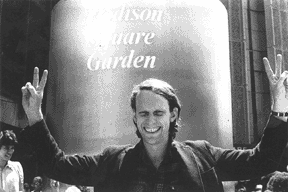
"We need films like this—films that remind us that it only takes a few brave people to make the world a different place." –– Kenn Rabin, Archival Film Researcher
"[E]ssential viewing for scholars, students, and anyone interested in the 1960s-era."
– Damon R. Bach, Senior Lecturer of History, Texas A&M University
"I loved this film. It brilliantly weaves together the fabric of the times in an accessible way. A must see for any student interested in social movements and social change."
–Susan Erenrich, Social Movement History Documentarian, Lecturer of Government Teaching, American University
Far Out: Life On & After the Commune, is an 85-minute documentary that tells the story of two rural New England communal farms. The film traces fifty years in the lives of a group of New England writers, activists and artists. It conveys not only how these “hippies” transformed Vermont and Western Massachusetts, but also how rural life and the people they met changed them.
.jpg)


The film’s story begins in the summer of 1968, in the middle of a left-wing faction fight, when a group of radical journalists from Liberation News Service (LNS) leave New York City for the country. The journalists founded two communes – at Packer Corners in Guilford, Vermont and the other in Montague, Massachusetts.
After leaving the city and turning away from national politics, the group of mostly young city slickers became pioneers in the back-to-the-land and organic farming movement. With the help of their neighbors, they spent the first five years learning rudimentary agricultural skills as well as how to live and work with each other as a communal family.
In 1973 when the local utility proposed a giant twin nuclear plant four miles from the Montague Farm, they became active opponents. In a dramatic act of civil disobedience, Sam Lovejoy, from the Montague Farm, toppled a 500-foot weather tower on the planned nuclear site. He turned himself in, and after a trial where he represented himself and drew national attention, was acquitted.
Subsequently, the group became leaders in the burgeoning 'No Nukes' movement–from the battles over the Seabrook nuclear plant to Diablo Canyon in California and scores of reactor sites in between. In 1979, they teamed up with Jackson Browne, Bonnie Raitt, John Hall, Graham Nash and other committed rock stars to help produce five nights of sold-out concerts at Madison Square Garden and a 250,000-person rally in New York City.
The Packer Corners farm also returned to politics, aiding in the anti-nuclear fight, as well as engaging with the local community through producing outdoor plays such as A Midsummer Night’s Dream, Alice in Wonderland, and The Tempest.


"Not shying away from the ingrained blind spots and prejudices (homophobia and sexism were inescapable themes) that mark even the most outwardly progressive groups, 'Far Out' features interviews with the aging but still involved former residents as they relate how they worked to make these communal living spaces truly equal."
- Portland Press Herald


In the summer of 2024, Far Out debuted with a successful five-week-run at the Latchis Theater in Brattleboro; setting a 25-year record for single-night sales at over 500, coming in second to only Barbie in the past five years for total ticket sales. The Far Out screening was sold-out at the Newburyport Film Festival, where it was awarded Best New England Feature. The film had a successful run in Hollywood, playing at several theaters in LA and other parts of California as well as Arizona and Texas during the spring of 2025.
Theatrical showings of the film continue in New England and have been spreading by public demand to Montpelier, Burlington, Woodstock, Bellows Falls, Essex, St. Albans in Vermont; Greenfield, Turners Falls, Amherst, Williamstown, Maynard, Newburyport and Lexington in Massachusetts; Damariscotta, Portland and Kittery in Maine; Hartford, CT and Peterborough and Keene in New Hampshire and many more.
For more information on the film, press kit and photos, or to host a screening, please contact Charles Light at clight@gmpfilms.com
Heading 1
"I was astounded by the emotional response the film has received" - Director Charles Light interviewed by WMCX television
Charles Light shares behind-the-scenes stories about the making of Far Out and tidbits about his personal life on Brattleboro Community Television's leading talk show, Here We Are.
Audience Responses to Far Out
A wonderful film. As a participant in this time I was deeply moved and still inspired. I cried through half of it and all that we felt back then. As with Lovejoy’s Nuclear War, I look forward to your work which allows me to reexperience my youth and friends
–Alan Surprenant, Retired Fire Fighter
Loved it! Important documentary on the 60s and beyond, including the struggles against construction of new nuclear power plants in Western Mass. and Seabrook, NH.
–Robin Read, Former rep at NH House of Representatives
Audiences share their reactions after a 'Far Out' showing in Hollywood


.png)












